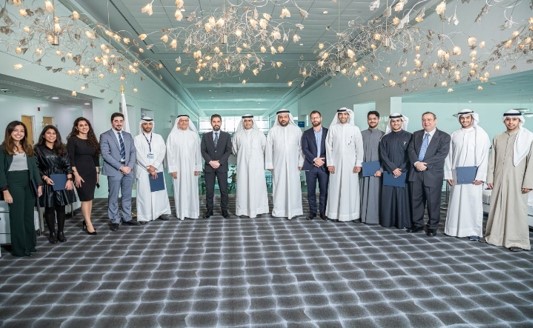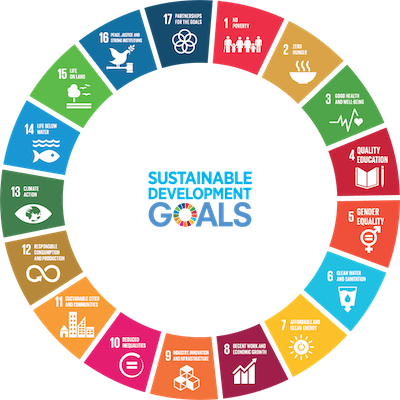SDG4: Quality Education

"Education for All" has been a popular slogan and has been given attention through different international development courses ever since 1990. It was considered critical at the inception of the Sustainable Development Goals (SDGs) and tagged SDG 4. Education is seen as a force for sustainable development, nation-building and peace. Children and young people who gain certain skills such as reading, writing, or counting are more likely to have a better future than their peers who lack these skills. The world is changing and globalization requires the world population to quickly adapt and learn to work with newer technologies.
The role of education in ensuring sustainable development is not limited to developing regions; but the whole world at large. The major aim of Sustainable Development Goal 4 (SDG 4) is to provide an inclusive and high-quality education that will improve the learner's standard of living and the community's future.
At the end of 2019, there were still millions of children out of school. The closure of schools in 2020 as part of the measures taken to slow the spread of COVID-19 is having an adverse impact on the learning outcome. It has affected more than 90 percent of the world's student population, with an estimated 1.5 billion children and young people having disrupted access to education. Across the world, limited access to the internet has also adversely impacted students' ability to engage in learning opportunities. It is estimated that at least a third of the world's children do not have the technology they need to participate in remote learning during the COVID-19 pandemic and the resulting widespread school closures. The pandemic has also resulted to an increase in educational inequalities with a completion rate of 79% for the well off and 34% for the poor households.
Access to educational resources for those not studying at the university
GUST Signs MOU with CFA Society Kuwait
Gulf University for Science and Technology (GUST) signed a Memorandum of Understanding with Chartered Financial Analyst (CFA) Society Kuwait with the aim to strengthen ties between both organizations in terms of academic and professional exchange. The agreement includes opportunity for specialists from both sides to access platforms and research materials and exchange educational and teaching materials, in addition to organizing joint events such as lectures and workshops aimed at developing the expertise of those interested in financial knowledge, especially for GUST's Finance major students.
The memorandum of understanding was signed between the two sides, in the presence of the Chairman of the Board of Trustees, Mr. Nawaf Arhamah Arhamah, the President of CFA Society Kuwait, Mr. Mohamed Al-Sarraf. The MOU agreement included the exchange of scientific and technical material, such as teaching material, training material, and relevant literature to the field of finance. Another aspect was the formation of several workshops, conferences, and lectures which would help mentor and breed potential CFA Level 1 candidates at GUST.

Chairman of the Board of Trustees, Mr. Nawaf Arhamah Arhamah, said "I am pleased to have finalized this agreement between the University and the CFA society in Kuwait, which comes as part of the University's aim to enhance the professional and academic experience of our students, specifically in the field of finance."

President of the Chartered Financial Analyst Society Kuwait, Mr. Muhammad Al-Sarraf, said "the association has participated and worked with GUST on several occasions over the past ten years, and that the signing of the memorandum of understanding represents a milestone in the relationship between these two prestigious institutions. CFA has great plans that it hopes to achieve with GUST especially in preparing students for the CFA certification exam."
Following the signing of the memorandum of understanding, GUST honored its second-place winning team in the CFA Institute Research Challenge competition with local universities. They were presented with certificates of achievement by the Chairman of the Board of Trustees, Nawaf Arhamah Arhamah, and the head of the Economics and Finance Department, Dr. Khaled ElMawazini. The names of the students who were honored included: Hassan Hani, Abdulaziz Al-Khashti, Fay Al-Olayan, Kawthar Odeh, Omar Hosam, Sarah Qabazard, Shawq Al-Zaben, Suleiman Al-Roumi, and Thanian Al-Mulla. They were all lead and mentored by Economics and Finance Department instructor, Dr. Mohammed Ali.
Professional Advancement & Continuing Education center
Healthcare Management & Quality Certificate (HMQ)

GUST have collaboration with Gates Group which is one of the primer institutions delivering health care management courses. The HMQ program is a professional interactive universal program qualifying practitioners in Healthcare Management & Quality Improvement since 2010. HMQ program facilitates the practitioner's interaction with experts having rich hands-on experience to gain knowledge and skills in 15 need-to-know multi-disciplinary domains for accreditation compliance.
HMQ is the practitioner's gate to bridge theory and practice of mainstream methodologies and tools in human-centered sustainable Organizational Development & Integrated Quality Improvement.
The program is open for enrollment to all interested candidates. The enrolment and the education resources are not free of charge.
GUST for SDGs specific researches on sustainability
- Alhashem, Fatimah. "Restructuring Teacher Policies for the sustainability of the Teaching Profession in Kuwait." Eurasian Journal of Educational Research 98.98 (2022): 38-57
- Uyar, Ali, et al. "Education, Digitalization and Tax Evasion: International Evidence." International Journal of Public Administration (2022): 1-16
- Nimer, Khalil, et al. "E-government, education quality, internet access in schools, and tax evasion." Cogent Economics & Finance 10.1 (2022): 2044587
Education for SDGs specific courses on sustainability
Have dedicated courses (full degrees, or electives) that address sustainability and the SDGs.Courses Related To SDGs
CAS = Collage of Arts and Sciences, CBA = Collage of Business Administration
| SDG | College | Course |
|---|---|---|
| SDG 4 - Quality Education | CAS | EDU 457 Secondary School Student Teaching 12.00 Prerequisite: EDU 451 & 452 & 453 & 454 & 455 Provides students with clinical teaching experience in secondary school classrooms under university and school supervision. |
| SDG 4 - Quality Education | CAS | ENGL 499 Practicum in Linguistics/Translation 3.00 Prerequisite: ENGL 414 Provides students with opportunities to explore career interests while applying knowledge and skills learned in the classroom in a work settings. Helps students gain a clearer sense of what they still need to learn or how their skills can be improved and provides an opportunity to build professional networks. |
| SDG 4 - Quality Education | CAS | MCM 455 Internship 3.00 Prerequisite: Junior Standing & UMCOM Professional attachment to an onsite professional media organization. Requires students to officially document work and hours performed. |
| SDG 4 - Quality Education | CAS | CSC 399 Internship in Computer Science 3.00 Prerequisite: Junior Standing Internship in computer science provides students with an opportunity to integrate theory and practice in a work setting. The course helps students to grow professionally and intellectually. It also sharpens their communication and teamwork skills. Enrolled students are required to complete a minimum of 150 working hours at approved organizations. Link for the Course descriptions: https://www.gust.edu.kw/content/college_arts_and_sciences_courses |
| SDG 4 - Quality Education | CBA | MGMT 488 Ethics & Corporate Social Responsibility 3.00 Topics: ethics and social responsibility in all aspects of business. This course exposes students to the importance of ethics and social responsibility in all aspects of business. It intends to demonstrate the breadth of responsibility of the individual manager, organization, and corporation in making "ethical" decisions. It gives not only understanding of main theoretical concepts, but also developing skills of identification, analysis and permission of ethical dilemmas on a workplace and managing ethics in organizations. Additionally, this course will include consideration of the enlarged spectrum of corporate stakeholders; corporate social responsibilities, citizenship and reputation; business-government relationships and political environmental management; sustainable development; environmental management and accountability; social investing and corporate philanthropy; community and employee relationships; and public affairs and media management. Students will also spend a great deal of time in class discussion ideas, participating in exercises, and practicing the skills necessary to perform well in this class and beyond. |
| SDG 4 - Quality Education | CBA | New Course MGMT 484 Ethics and Corporate Social Responsibility Topics: will address all goals as part of the curriculum This course exposes students to the importance of ethics and social responsibility in all aspects of business. It intends to demonstrate the breadth of responsibility of the individual manager, organization, and corporation in making "ethical" decisions. Additionally, this course will include consideration of the enlarged spectrum of corporate stakeholders; corporate social responsibilities, citizenship and reputation; business-government relationships and political environmental management; sustainable development; environmental management and accountability; social investing and corporate philanthropy; community and employee relationships; and public affairs and media management |
| SDG 4 - Quality Education | CAS | EDU 457 Secondary School Student Teaching 12.00 Prerequisite: EDU 451 & 452 & 453 & 454 & 455 Provides students with clinical teaching experience in secondary school classrooms under university and school supervision. |
| SDG 4 - Quality Education | CAS | ENGL 499 Practicum in Linguistics/Translation 3.00 Prerequisite: ENGL 414 Provides students with opportunities to explore career interests while applying knowledge and skills learned in the classroom in a work settings. Helps students gain a clearer sense of what they still need to learn or how their skills can be improved and provides an opportunity to build professional networks. |
| SDG 4 - Quality Education | CAS | MCM 455 Internship 3.00 Prerequisite: Junior Standing & UMCOM Professional attachment to an onsite professional media organization. Requires students to officially document work and hours performed. |
| SDG 4 - Quality Education | CAS | CSC 399 Internship in Computer Science 3.00 Prerequisite: Junior Standing Internship in computer science provides students with an opportunity to integrate theory and practice in a work setting. The course helps students to grow professionally and intellectually. It also sharpens their communication and teamwork skills. Enrolled students are required to complete a minimum of 150 working hours at approved organizations. Link for the Course descriptions: https://www.gust.edu.kw/content/college_arts_and_sciences_courses |
| SDG 4 - Quality Education | CBA | MGMT 488 Ethics & Corporate Social Responsibility 3.00 Topics: ethics and social responsibility in all aspects of business. This course exposes students to the importance of ethics and social responsibility in all aspects of business. It intends to demonstrate the breadth of responsibility of the individual manager, organization, and corporation in making "ethical" decisions. It gives not only understanding of main theoretical concepts, but also developing skills of identification, analysis and permission of ethical dilemmas on a workplace and managing ethics in organizations. Additionally, this course will include consideration of the enlarged spectrum of corporate stakeholders; corporate social responsibilities, citizenship and reputation; business-government relationships and political environmental management; sustainable development; environmental management and accountability; social investing and corporate philanthropy; community and employee relationships; and public affairs and media management. Students will also spend a great deal of time in class discussion ideas, participating in exercises, and practicing the skills necessary to perform well in this class and beyond. |
| SDG 4 - Quality Education | CBA | New Course MGMT 484 Ethics and Corporate Social Responsibility Topics: will address all goals as part of the curriculum This course exposes students to the importance of ethics and social responsibility in all aspects of business. It intends to demonstrate the breadth of responsibility of the individual manager, organization, and corporation in making "ethical" decisions. Additionally, this course will include consideration of the enlarged spectrum of corporate stakeholders; corporate social responsibilities, citizenship and reputation; business-government relationships and political environmental management; sustainable development; environmental management and accountability; social investing and corporate philanthropy; community and employee relationships; and public affairs and media management |
| SDG 4 - Quality Education | CAS | EDU 457 Secondary School Student Teaching 12.00 Prerequisite: EDU 451 & 452 & 453 & 454 & 455 Provides students with clinical teaching experience in secondary school classrooms under university and school supervision. |
| SDG 4 - Quality Education | CAS | ENGL 499 Practicum in Linguistics/Translation 3.00 Prerequisite: ENGL 414 Provides students with opportunities to explore career interests while applying knowledge and skills learned in the classroom in a work settings. Helps students gain a clearer sense of what they still need to learn or how their skills can be improved and provides an opportunity to build professional networks. |
| SDG 4 - Quality Education | CAS | MCM 455 Internship 3.00 Prerequisite: Junior Standing & UMCOM Professional attachment to an onsite professional media organization. Requires students to officially document work and hours performed. |
| SDG 4 - Quality Education | CAS | CSC 399 Internship in Computer Science 3.00 Prerequisite: Junior Standing Internship in computer science provides students with an opportunity to integrate theory and practice in a work setting. The course helps students to grow professionally and intellectually. It also sharpens their communication and teamwork skills. Enrolled students are required to complete a minimum of 150 working hours at approved organizations. Link for the Course descriptions: https://www.gust.edu.kw/content/college_arts_and_sciences_courses |
| SDG 4 - Quality Education | CBA | MGMT 488 Ethics & Corporate Social Responsibility 3.00 Topics: ethics and social responsibility in all aspects of business. This course exposes students to the importance of ethics and social responsibility in all aspects of business. It intends to demonstrate the breadth of responsibility of the individual manager, organization, and corporation in making "ethical" decisions. It gives not only understanding of main theoretical concepts, but also developing skills of identification, analysis and permission of ethical dilemmas on a workplace and managing ethics in organizations. Additionally, this course will include consideration of the enlarged spectrum of corporate stakeholders; corporate social responsibilities, citizenship and reputation; business-government relationships and political environmental management; sustainable development; environmental management and accountability; social investing and corporate philanthropy; community and employee relationships; and public affairs and media management. Students will also spend a great deal of time in class discussion ideas, participating in exercises, and practicing the skills necessary to perform well in this class and beyond. |
| SDG 4 - Quality Education | CBA | New Course MGMT 484 Ethics and Corporate Social Responsibility Topics: will address all goals as part of the curriculum This course exposes students to the importance of ethics and social responsibility in all aspects of business. It intends to demonstrate the breadth of responsibility of the individual manager, organization, and corporation in making "ethical" decisions. Additionally, this course will include consideration of the enlarged spectrum of corporate stakeholders; corporate social responsibilities, citizenship and reputation; business-government relationships and political environmental management; sustainable development; environmental management and accountability; social investing and corporate philanthropy; community and employee relationships; and public affairs and media management |
| SDG 4 - Quality Education | CAS | EDU 457 Secondary School Student Teaching 12.00 Prerequisite: EDU 451 & 452 & 453 & 454 & 455 Provides students with clinical teaching experience in secondary school classrooms under university and school supervision. |
| SDG 4 - Quality Education | CAS | ENGL 499 Practicum in Linguistics/Translation 3.00 Prerequisite: ENGL 414 Provides students with opportunities to explore career interests while applying knowledge and skills learned in the classroom in a work settings. Helps students gain a clearer sense of what they still need to learn or how their skills can be improved and provides an opportunity to build professional networks. |
| SDG 4 - Quality Education | CAS | MCM 455 Internship 3.00 Prerequisite: Junior Standing & UMCOM Professional attachment to an onsite professional media organization. Requires students to officially document work and hours performed. |
| SDG 4 - Quality Education | CAS | CSC 399 Internship in Computer Science 3.00 Prerequisite: Junior Standing Internship in computer science provides students with an opportunity to integrate theory and practice in a work setting. The course helps students to grow professionally and intellectually. It also sharpens their communication and teamwork skills. Enrolled students are required to complete a minimum of 150 working hours at approved organizations. Link for the Course descriptions: https://www.gust.edu.kw/content/college_arts_and_sciences_courses |
| SDG 4 - Quality Education | CBA | MGMT 488 Ethics & Corporate Social Responsibility 3.00 Topics: ethics and social responsibility in all aspects of business. This course exposes students to the importance of ethics and social responsibility in all aspects of business. It intends to demonstrate the breadth of responsibility of the individual manager, organization, and corporation in making "ethical" decisions. It gives not only understanding of main theoretical concepts, but also developing skills of identification, analysis and permission of ethical dilemmas on a workplace and managing ethics in organizations. Additionally, this course will include consideration of the enlarged spectrum of corporate stakeholders; corporate social responsibilities, citizenship and reputation; business-government relationships and political environmental management; sustainable development; environmental management and accountability; social investing and corporate philanthropy; community and employee relationships; and public affairs and media management. Students will also spend a great deal of time in class discussion ideas, participating in exercises, and practicing the skills necessary to perform well in this class and beyond. |

 Main Page
Main Page Download PDF
Download PDF